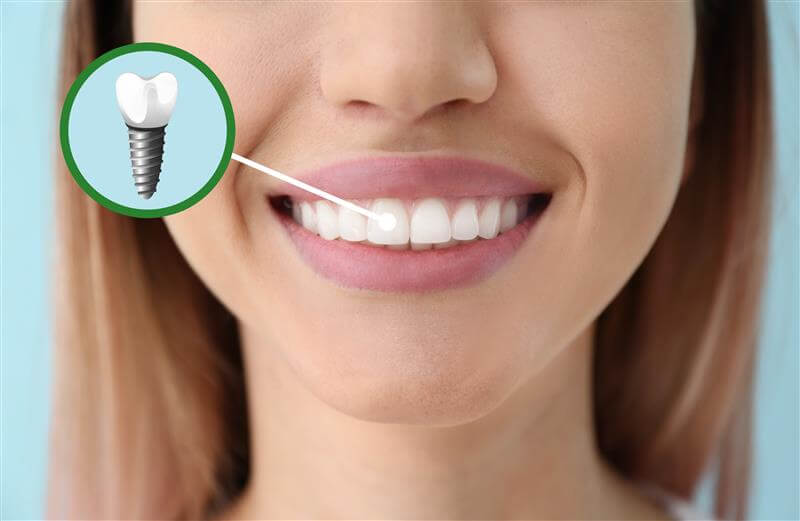Can Dental Implants Get Cavities? Understanding Implant Care and Longevity

Let’s start by giving you a straight answer: “No, they can’t.”
Unlike natural teeth, dental implants in New Albany and elsewhere are built from inorganic materials. These include the titanium-based tooth root and the composite or metal crown. The dental crown itself has high resistance to acids that otherwise eat through enamel with ease, and most modern implants undergo surface treatment to further acid protection.
And honestly, we could’ve ended the discussion here. However, dental cavities in implants are at rock bottom of your list of worries. As we’ve explained time and time again, there are other ways for dental implants to fail—most of which are caused by poor oral hygiene. Here’s everything you need to know about dental implant longevity and care.
Ways Dental Implants Can Fail
It’s important not to give dental implants an impression of invincibility. Similar to anything made by human hands, their efficacy wanes over time. Our previous post on the longevity of dental implants goes in-depth on this, but the gist is that the failure rate is more or less double for implants affected by patient health and lifestyle choices than by implant quality.
DENTAL IMPLANT PERFORMANCE (n = 10,871 implants on 4,247 patients)
| Years Since Implant Date | Survival Rate | Years Since Implant Date | Incidence Rate | ||
| Implant-Level1 | Patient-Level2 | Peri-Implant Mucositis3 | Peri-Implantitis4 | ||
| 3 Years | 98.9% | 97.4% | 2-3 Years | 9.4% | 2.0% |
| 5 Years | 98.5% | 96.7% | 4-5 Years | 9.3% | 2.6% |
| 10 Years | 96.8% | 92.5% | 6-7 Years | 12.1% | 3.2% |
| 15 Years | 94.0% | 86.0% | > 8 Years | 11.9% | 7.1% |
1Factors like implant position and service life
2Factors like age, lifestyle, and current medical conditions
3Inflammation of the immediate bone area without bone loss
4Inflammation of the immediate bone area resulting in bone loss
Source: French et al. (2021)
The advantage of dental implants lies in their lifelong lifespan. A failure rate of 6% after 15 years is nothing short of impressive as far as dental treatments go. The root rarely requires replacement, and the crown is often replaced due to discoloration or damage.
That said, it’s a major problem when the entire implant system fails. Below are some of the most common ways it doesn’t work as designed.
-
Osseointegration Failure
Dental implants are designed to anchor deep into the gum tissue to provide a stable foundation for the crown. As such, manufacturers work with titanium for the anchor or root due to its ability to fuse with gum tissue without major complications.
However, the body’s response to a foreign object being implanted varies by patient. In some cases, the body refuses to initiate osseointegration—the process of fusing the implant root with gum tissue—or does so but fails to fuse enough bone mass.
Sometimes, there isn’t simply enough bone to support the implant. Other times, most of the needed bone mass has been lost to years of unhealthy habits such as smoking and infrequent oral cleaning. While not a disqualifying condition, it can delay a patient’s implant need behind pre-implant procedures like bone grafting.
-
Peri-Implant Disease
A complete osseointegration can be followed by inflammation of the gum tissue surrounding the dental implant. The resulting immune response can damage the tissue to the point of breaking down, compromising the implant’s stability.
According to the American Academy of Periodontology, peri-implant diseases begin with peri-implant mucositis. Simply put, this refers to inflammation of nearby gum tissue without any bone loss. Dentists would take this opportunity to manage such cases, from professional cleaning to advising regular dental hygiene.
As soon as bone loss occurs, it becomes a case of peri-implantitis, which is much harder to manage. Treatments include antiseptics or antibiotics, decontamination using solutions, and—for severe cases—resective or regenerative surgery.
-
Implant Fracture
Titanium may be well-known for being more durable than steel, but it’s by no means invulnerable to physical damage. With enough biting force, the implant can develop a fracture that renders it unusable. Unconscious teeth grinding (known as bruxism) and forcing to eat rock-hard foods are common risk factors.
Depending on the extent of the fracture, the dentist may fix the damage or swap out the implant entirely. Either procedure won’t come cheap for dental implant patients.
Caring for Your Implants

Given the steep cost of dental implants, it’s reasonable for patients to pay for one or as few of them as possible. After that, patients have to do their utmost to preserve the remaining healthy natural teeth they have. Fortunately, the steps to proper dental implant care aren’t any different from exercising proper oral hygiene.
-
Visit Your Dentist According to Schedule
Dental implants need to be checked regularly for changes in their position post-procedure, among other things. Dentists generally advise such checks every six months, which coincides with oral cleaning. Naturally, there’s no need to wait for this long if you encounter problems with your implant.
-
Avoid Hard Foods for the First Six Weeks
As mentioned earlier, eating hard foods can risk fracturing your implant (or pushing it out of position). It’s better to give it time to solidify its hold, with the minimum time following the dental implant process being six weeks. During this time, refrain from foods that require significant effort in chewing, such as nuts and hard candies.
Once the consolidation period is over, ask your dentist first if it’s safe to transition to a normal diet. Even at that point, it is wise to continue avoiding foods that are not suitable for chewing.
-
Brush and Floss Twice a Day
The proper way to clean your teeth hasn’t changed; brushing and flossing twice a day remains the ideal routine. Remember to brush and floss gently, especially if your implant is still consolidating. Mouthwash is optional but a good extra step.
-
Ditch Unhealthy Lifestyles
The moment you receive your implant, the goal becomes preserving the gum tissue for as long as possible. If you’re a heavy smoker or drinker, it’s important to start on the path to withdrawal. If you don’t smoke or are a casual drinker, drink responsibly and don’t even think about smoking.






